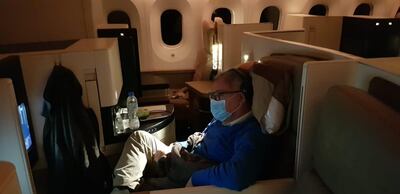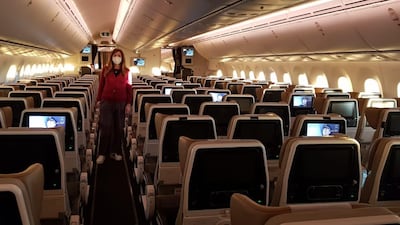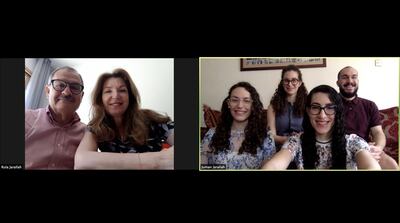My parents have been fortunate to spend decades travelling. In their lifetimes, they have witnessed the rise of airlines in the Middle East and flown on Concorde. But never had they boarded a commercial flight where the staff outnumbered the passengers.
My mum and dad, Rula and Sa-ed Jarallah, returned to the UAE – their home of 20 years – late on Saturday night after more than four months away.
They were in Messery, France, when the UAE closed its borders in March to prevent the spread of Covid-19.
They had intended to stay at their holiday home until April but quickly rebooked their flight from Geneva, the nearest airport, after the virus went from an epidemic to a pandemic.
A day before they were due to travel, France closed its borders and most flights around the world were grounded.
My parents immediately applied for a government re-entry permit through the Twajudi portal. They faced similar issues that many of the 200,000 residents stuck abroad experienced; spending hours on hotlines and trying to get information. Staff at the UAE’s embassies in France and Switzerland told them they would have to be patient.
Despite the initial stress, we knew we were fortunate to be safe and that my parents were lucky to be in their own home.
The next four months were filled with coronavirus tropes: working from home, Zoom catch-ups and online food shopping.
My three siblings and I had our first Ramadan without our parents and our annual traditional Eid family photo was taken over Zoom, at my insistence.
In June, the UAE said it would begin returning residents to the Emirates. This brought hope to thousands abroad but was also around the time many residents, including my parents, had their applications rejected. A text message said they did not “meet the UAE’s requirements” to return.
They reapplied and, a week later, their permit from the Federal Authority for Identity and Citizenship (ICA) came through. They had 21 days to return.
By then, cases in France and Switzerland had come under control and the soft border between the countries had reopened.
My parents packed up the house and booked two business class tickets on an Etihad flight from Geneva on July 4. The airline advised them to arrive three hours early and prepare to spend several hours at Abu Dhabi International Airport while safety procedures were carried out.
They checked in online and were given their boarding passes at the airport after dropping off luggage and presenting their ICA permit.
The lounges were closed so they spent the rest of the three hours sat at one of the only cafes open in an almost empty airport.
An Etihad employee checked their temperatures as they boarded the EY53 flight, a Boeing 787 Dreamliner, which typically seats around 250 people. They took their seats and boarding was complete - they were the only passengers.

The Etihad personal kits contained new additions of face masks, hand gel and gloves. Flight attendants wore masks, gloves, hazmat suits and face shields.
My parents kept their masks on for most of the journey but for lunch, which was served on glass plates.
An Etihad representative said the weekly flights from Geneva, like most operated during the pandemic, was predominately to transport cargo. The more popular routes can be fully booked but it is not uncommon for flights to be almost empty of passengers at this time, she said.
Six hours after take-off, my parents arrived in a very different Abu Dhabi than the one they left months before.
They landed in an empty airport at 10.30pm to find most shops closed. They saw only two other travellers at the airport.
They passed though a thermal scanner before reaching the first checkpoint, where an airport officer photocopied their passports and residency visas and gave them an agreement to sign, promising to download Al Hosn, a government contact tracing app, and stay home for two weeks. They were also given a PCR testing kit and directed to a screening station.
Inside the cubicle, they had nasal swab tests and were told results would be processed within three days.
At passport control, they presented their ICA permit again, gave the officer the photocopied papers and the signed declaration.
Their passports were stamped and the baggage belt presented them with the only two pieces of luggage on the plane before they made their way home.
They said the process could not have been simpler and staff could not have been kinder.
A day later, my mum received her negative result and finally gave us all hugs.
My dad’s results are yet to come through, so his hugs have been delayed. But we are all relieved to have a full house again.












